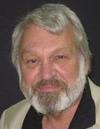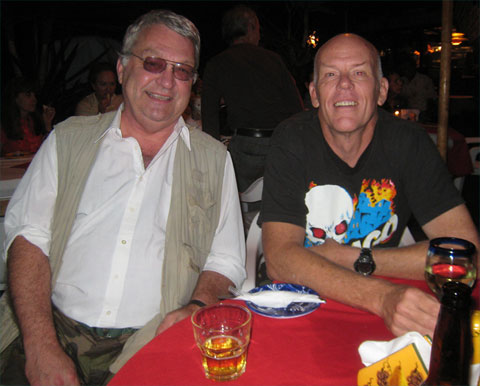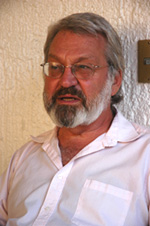Joe After a vibrant life, Joe Bageant died yesterday following a four-month struggle with cancer. He was 64. Joe is survived by his wife, Barbara, his three children, Timothy, Patrick and Elizabeth, and thousands of friends and admirers. He is also survived by his work and ideas.
According to Joe's wishes, he will be cremated. His family will hold a private memorial service.
By Fred Reed
www.fredoneverything.net
Jocotepec, Mexico -- Joe lived awhile down the lake. We would visit him of an afternoon, Vi and I, and find him, a bear of a man, bearded mountain Buddha, writing on the porch of his one-room place in Ajijic. Always he wore his old fishing vest, in which I suspect he was born, and sometimes he carried a small laptop in one of its pockets. Usually we adjourned to the living room, which was also the bedroom, dining room, and salon. He would fetch bottles of local red, or make the jalapeño martinis he invented -- there was a bit of mad chemist in him -- and we would talk for hours of art, music, the news, politics, and people. Especially people. Sometimes he grabbed one of the guitars from the wall and sang blues, at which he was good. I guess growing up dirt poor in West Virginia puts that kind of music in you.
Joe could fool you. He talked slow and Southern, lacked pretensions, and you could talk to him for weeks without realizing how very damned smart he was. One day we dropped in and he said he had just found that he had cancer. It went fast. He died Saturday.
Most who have heard of him have done so through his books, Deer Hunting with Jesus: Dispatches from America's Class War, and Rainbow Pie: A Redneck Memoir. Deer Hunting is a curious work, a sleeper, that you can read the first time without noticing that it deserves a high place in American letters. He tells of that huge class of unnoticed people in America, the white underclass of a thousand small towns and countryscapes, of Winchester, Virginia where he lived and by implication to Waldorf, Maryland and King George, Virginia and, well, all over the Carolinas and the Cumberland Plateau and … everywhere. America thinks it is a middle-class country. It isn't. Joe knew.
You wouldn't see it at first as sociology. Sociology is supposed to be written in drab, repetitive, half-literate, numbingly narcotic prose that would make an anvil beg for mercy. Joe was more Twain. Never eat cocktail weenies out of the urinal, he said, no matter how high the betting gets, while talking of people working whole lives in jobs without benefits or retirement and generally getting screwed. He had no patience for smug commentators in Washington who talked at half a million bucks a year of how America was a land of opportunity if only you worked hard. It isn't. He knew it. So did I, having grown up in rural King George Country, Virginia, where the same people lived. He was exactly right.
He lived largely, coming out of the mountains and spending a year at the Corcoran School of Art, and drifting west where his immense talent had him spending a lot of time with Hunter Thompson and the giants of the era and writing for all manner of publications. He believed deeply in booze and recreational drugs, which in those years was perhaps not a view unique to him. Shortly before his death he told Vi and me about having met some local Mexican folk here of Indian antecedents and going up in the hills one night to do mushrooms, and lying out half the night watching the stars swirl and dance. He lived for years on an Indian reservation without electricity, worked as an editor for Military History magazine, likewise for an agribusiness magazine flogging pesticides, and told horrendous stories about what we actually eat. He was miserable at Military History, but needed to live.
He went to the internet, driven to write for whatever reasons drive people to write, and got found by Dan Greenberg, the literary agent. Agents, and publishing houses in New York, are generally characterized by a lack of knowledge of writing, writers, America, and books, but Greenberg was lax in observing the traditions of his trade. He asked Joe to write a book. Which Joe did.
The consequences were odd. Deer Hunting became immensely popular in … Australia. It sold well in … England. It was translated into Spanish, twice, in Spain and … Argentina. Argentina? Joe was invited to 10 Downing Street, did countless radio interviews in Australia, a book tour in Italy. Rainbow Pie would go into German and Italian. It was by comparison ignored in America. Something is very wrong somewhere. I'm not sure what.
Maybe New York just doesn't like rural people, or doesn't know that there are any. And there was certainly a rural flavor to the man. Seeing a young woman with piercings in her nose and ears and God knows whereall, he commented that she seemed to have fallen face-first into a tackle box. His politics may have confused the chattering classes. Joe was the least racist guy who ever lived, but he wrote about the white poor, whose very existence runs against hallowed doctrine. He was also explicitly in favor of the Second Amendment, noting that ninety pounds of dressed venison matters a whole lot to many families. These are families that reviewers of books have never heard of.
Joe described himself as a redneck socialist, and he was. He was profoundly concerned with the fate of the people he wrote about, those who worked hard all their lives and ended up with nothing. Funny: I've never met a socialist who didn't care about others, or a capitalist who did. The truth is that a great many decent people are on the wrong side of the intelligence curve, don't come from families that send their young to university,and can't protect themselves from the corporate lawyers and bought legislatures.
It wasn't a pose. He really and truly, honestly, demonstrably and implausibly, had no interest in money. He lived for some time in Hopkins Village in Belize, a seaside community of black, downscale Garifuna and, when some money began to come in from Deer Hunting, regularly gave it away to help the locals. He didn't have a sainthood complex. He just didn't care. He wanted books, a guitar, friends, internet, wine, and occasional substances not approved of by DEA. No pretenses. Drop acid, not names.
When he had to choose between horrible surgery of dubious prospect, and just saying, "Nah," he said "Nah." Joe was going to start Spanish lessons with Vi once he got past the paperwork of Rainbow Pie, but I guess that's not going to happen. We'll miss the throaty blues and mountain ballads, the discovery that Edward Hopper was our favorite painter, the jalapeño martinis barely drinkable though they were, and swapping tales of wild times and odd places. And the sheer good-hearted intelligence of the man.
It was great, brother. Hope to see you again in a few years.
Joe After a vibrant life, Joe Bageant died yesterday following a four-month struggle with cancer. He was 64. Joe is survived by his wife, Barbara, his three children, Timothy, Patrick and Elizabeth, and thousands of friends and admirers. He is also survived by his work and ideas.
According to Joe's wishes, he will be cremated. His family will hold a private memorial service.
By Fred Reed
www.fredoneverything.net
Jocotepec, Mexico -- Joe lived awhile down the lake. We would visit him of an afternoon, Vi and I, and find him, a bear of a man, bearded mountain Buddha, writing on the porch of his one-room place in Ajijic. Always he wore his old fishing vest, in which I suspect he was born, and sometimes he carried a small laptop in one of its pockets. Usually we adjourned to the living room, which was also the bedroom, dining room, and salon. He would fetch bottles of local red, or make the jalapeño martinis he invented -- there was a bit of mad chemist in him -- and we would talk for hours of art, music, the news, politics, and people. Especially people. Sometimes he grabbed one of the guitars from the wall and sang blues, at which he was good. I guess growing up dirt poor in West Virginia puts that kind of music in you.
Joe could fool you. He talked slow and Southern, lacked pretensions, and you could talk to him for weeks without realizing how very damned smart he was. One day we dropped in and he said he had just found that he had cancer. It went fast. He died Saturday.
Most who have heard of him have done so through his books, Deer Hunting with Jesus: Dispatches from America's Class War, and Rainbow Pie: A Redneck Memoir. Deer Hunting is a curious work, a sleeper, that you can read the first time without noticing that it deserves a high place in American letters. He tells of that huge class of unnoticed people in America, the white underclass of a thousand small towns and countryscapes, of Winchester, Virginia where he lived and by implication to Waldorf, Maryland and King George, Virginia and, well, all over the Carolinas and the Cumberland Plateau and … everywhere. America thinks it is a middle-class country. It isn't. Joe knew.
You wouldn't see it at first as sociology. Sociology is supposed to be written in drab, repetitive, half-literate, numbingly narcotic prose that would make an anvil beg for mercy. Joe was more Twain. Never eat cocktail weenies out of the urinal, he said, no matter how high the betting gets, while talking of people working whole lives in jobs without benefits or retirement and generally getting screwed. He had no patience for smug commentators in Washington who talked at half a million bucks a year of how America was a land of opportunity if only you worked hard. It isn't. He knew it. So did I, having grown up in rural King George Country, Virginia, where the same people lived. He was exactly right.
He lived largely, coming out of the mountains and spending a year at the Corcoran School of Art, and drifting west where his immense talent had him spending a lot of time with Hunter Thompson and the giants of the era and writing for all manner of publications. He believed deeply in booze and recreational drugs, which in those years was perhaps not a view unique to him. Shortly before his death he told Vi and me about having met some local Mexican folk here of Indian antecedents and going up in the hills one night to do mushrooms, and lying out half the night watching the stars swirl and dance. He lived for years on an Indian reservation without electricity, worked as an editor for Military History magazine, likewise for an agribusiness magazine flogging pesticides, and told horrendous stories about what we actually eat. He was miserable at Military History, but needed to live.
He went to the internet, driven to write for whatever reasons drive people to write, and got found by Dan Greenberg, the literary agent. Agents, and publishing houses in New York, are generally characterized by a lack of knowledge of writing, writers, America, and books, but Greenberg was lax in observing the traditions of his trade. He asked Joe to write a book. Which Joe did.
The consequences were odd. Deer Hunting became immensely popular in … Australia. It sold well in … England. It was translated into Spanish, twice, in Spain and … Argentina. Argentina? Joe was invited to 10 Downing Street, did countless radio interviews in Australia, a book tour in Italy. Rainbow Pie would go into German and Italian. It was by comparison ignored in America. Something is very wrong somewhere. I'm not sure what.
Maybe New York just doesn't like rural people, or doesn't know that there are any. And there was certainly a rural flavor to the man. Seeing a young woman with piercings in her nose and ears and God knows whereall, he commented that she seemed to have fallen face-first into a tackle box. His politics may have confused the chattering classes. Joe was the least racist guy who ever lived, but he wrote about the white poor, whose very existence runs against hallowed doctrine. He was also explicitly in favor of the Second Amendment, noting that ninety pounds of dressed venison matters a whole lot to many families. These are families that reviewers of books have never heard of.
Joe described himself as a redneck socialist, and he was. He was profoundly concerned with the fate of the people he wrote about, those who worked hard all their lives and ended up with nothing. Funny: I've never met a socialist who didn't care about others, or a capitalist who did. The truth is that a great many decent people are on the wrong side of the intelligence curve, don't come from families that send their young to university,and can't protect themselves from the corporate lawyers and bought legislatures.
It wasn't a pose. He really and truly, honestly, demonstrably and implausibly, had no interest in money. He lived for some time in Hopkins Village in Belize, a seaside community of black, downscale Garifuna and, when some money began to come in from Deer Hunting, regularly gave it away to help the locals. He didn't have a sainthood complex. He just didn't care. He wanted books, a guitar, friends, internet, wine, and occasional substances not approved of by DEA. No pretenses. Drop acid, not names.
When he had to choose between horrible surgery of dubious prospect, and just saying, "Nah," he said "Nah." Joe was going to start Spanish lessons with Vi once he got past the paperwork of Rainbow Pie, but I guess that's not going to happen. We'll miss the throaty blues and mountain ballads, the discovery that Edward Hopper was our favorite painter, the jalapeño martinis barely drinkable though they were, and swapping tales of wild times and odd places. And the sheer good-hearted intelligence of the man.
It was great, brother. Hope to see you again in a few years.
Family Members
Sponsored by Ancestry
Advertisement
Advertisement









